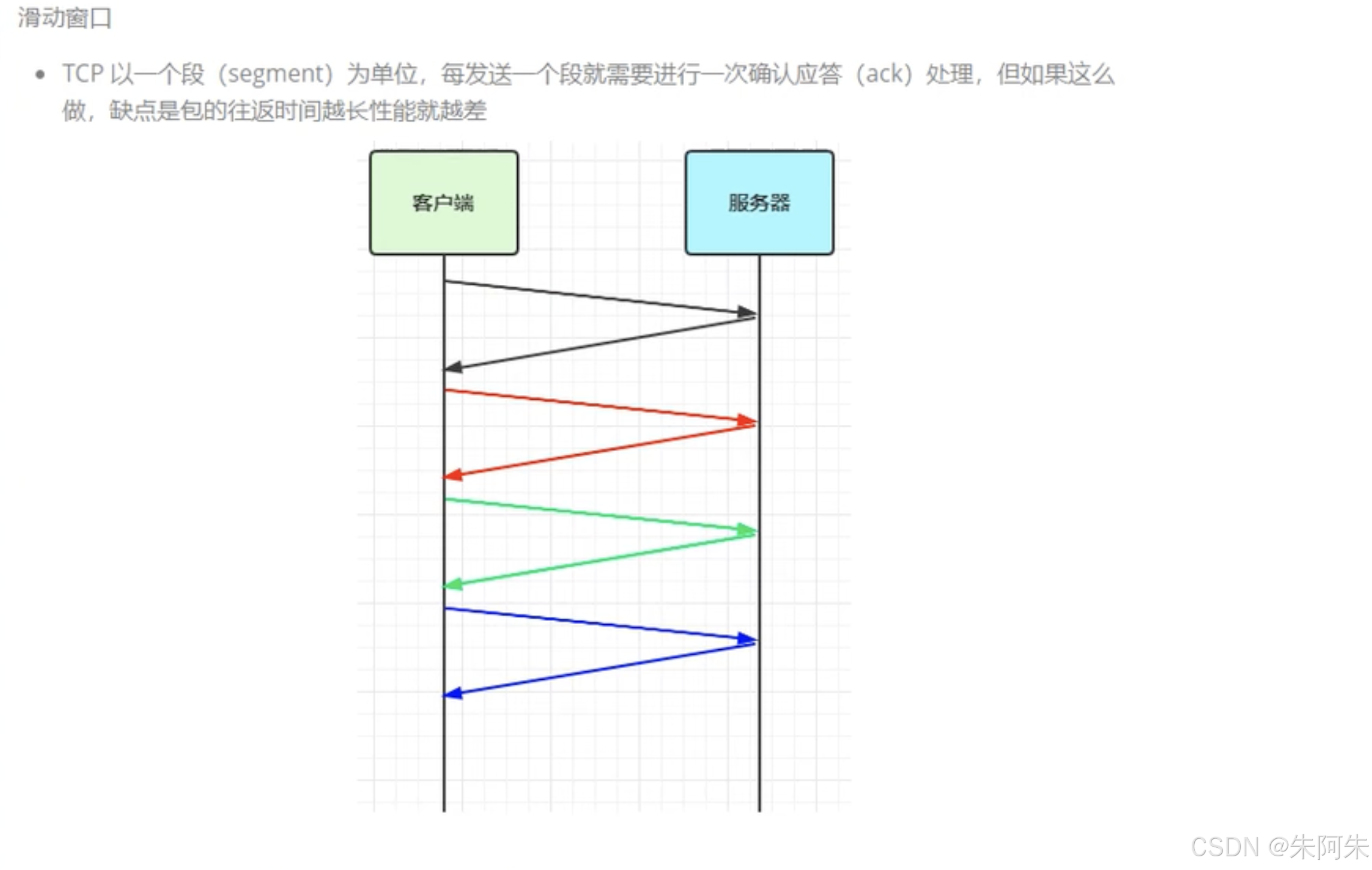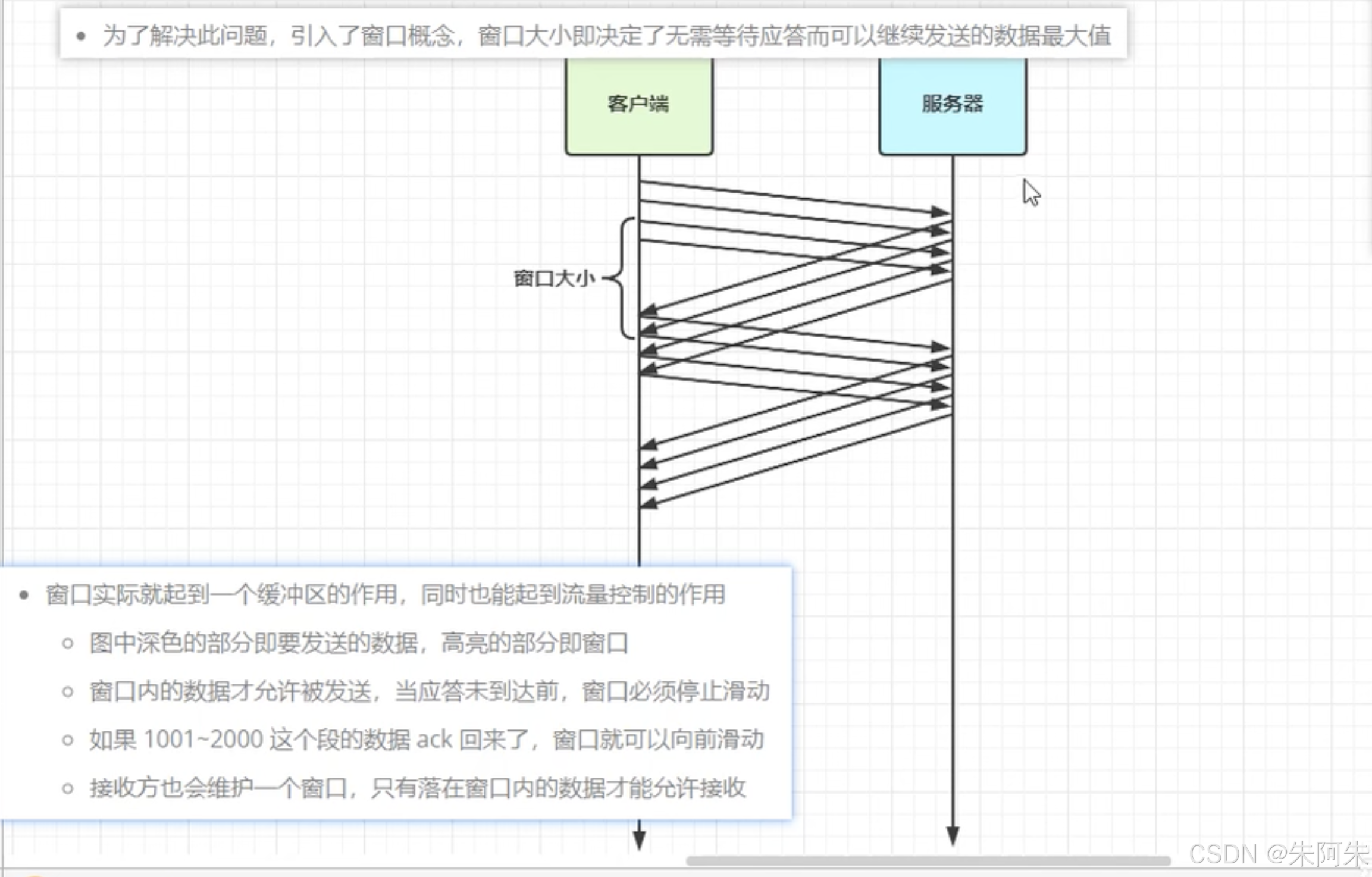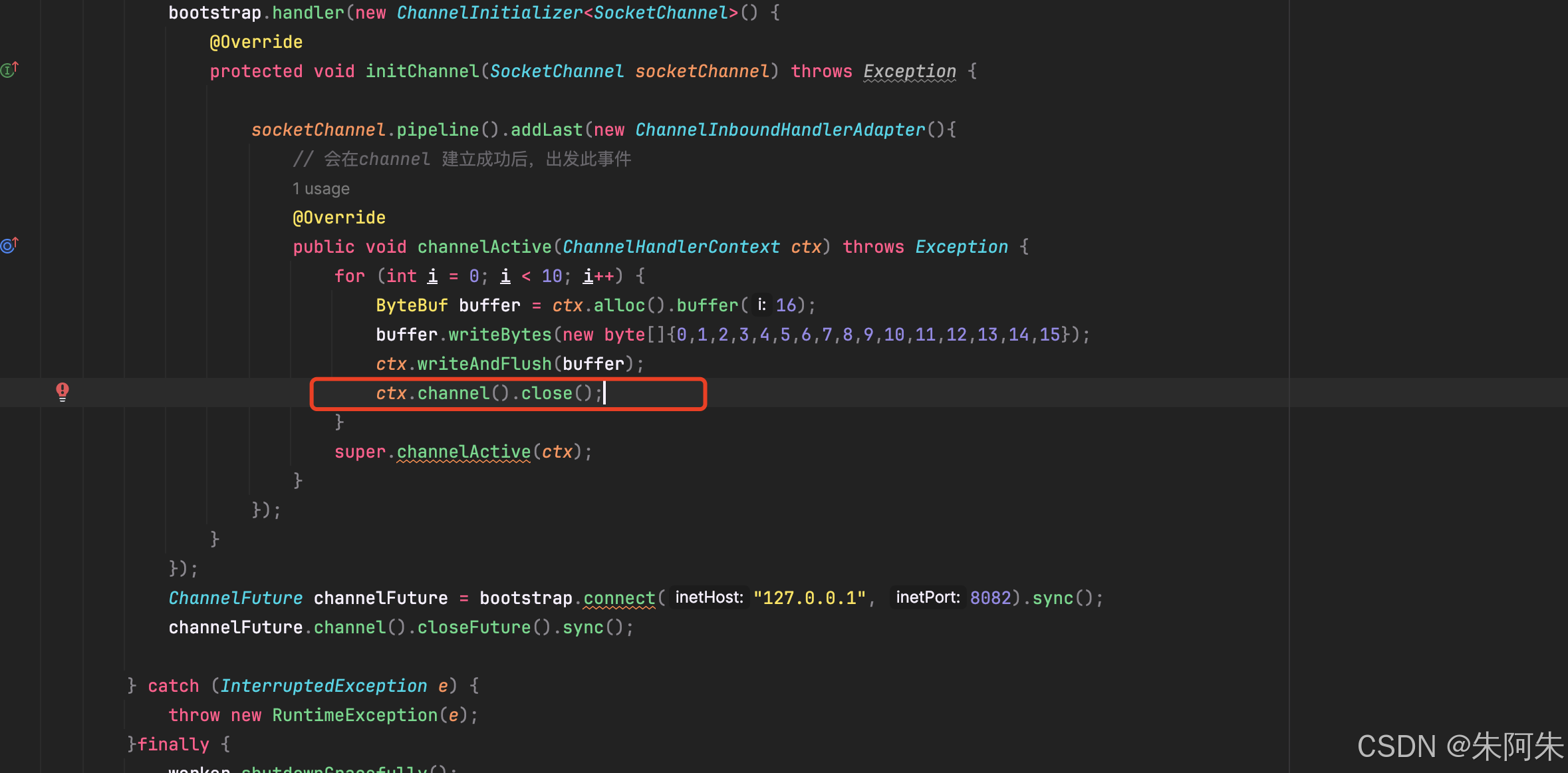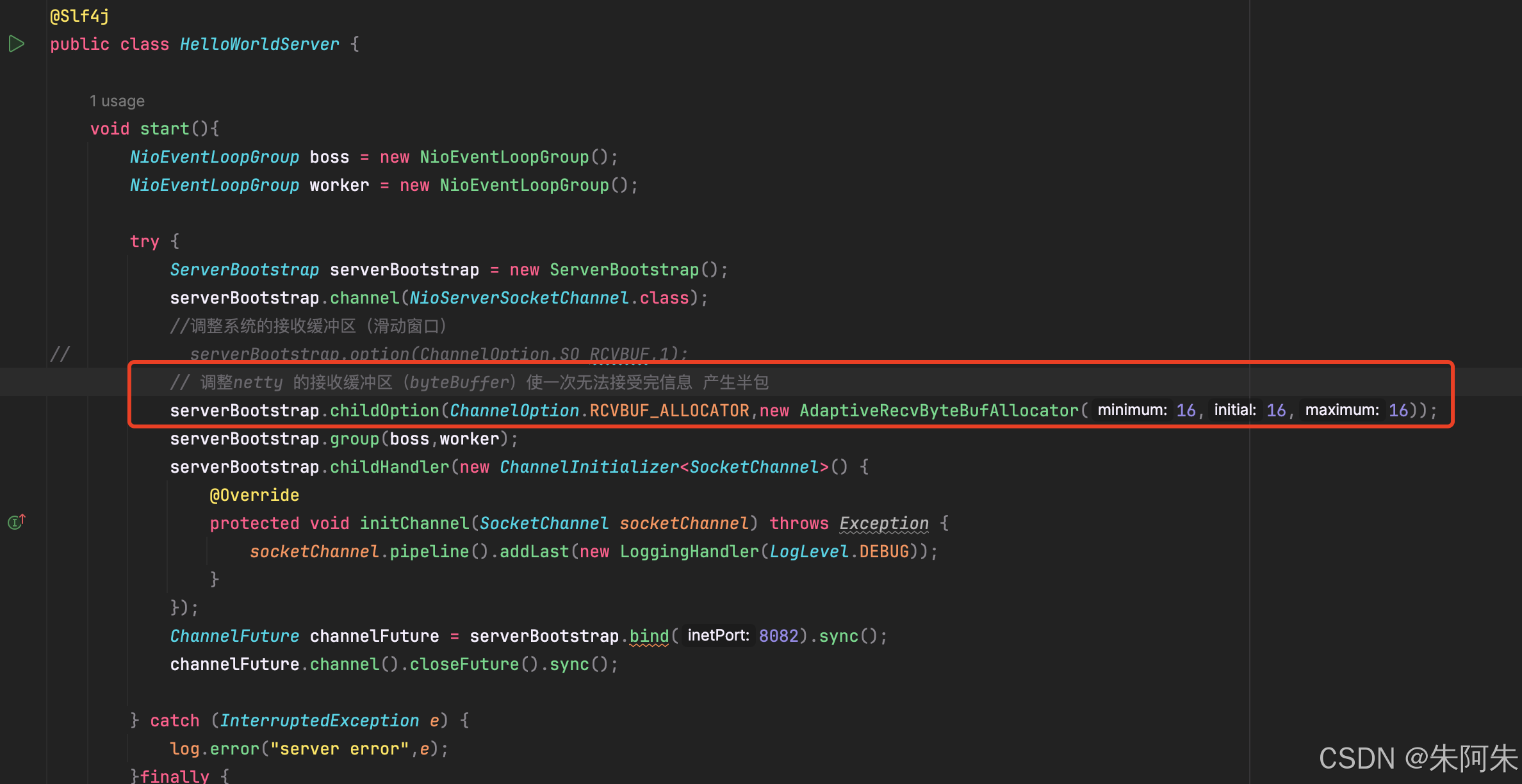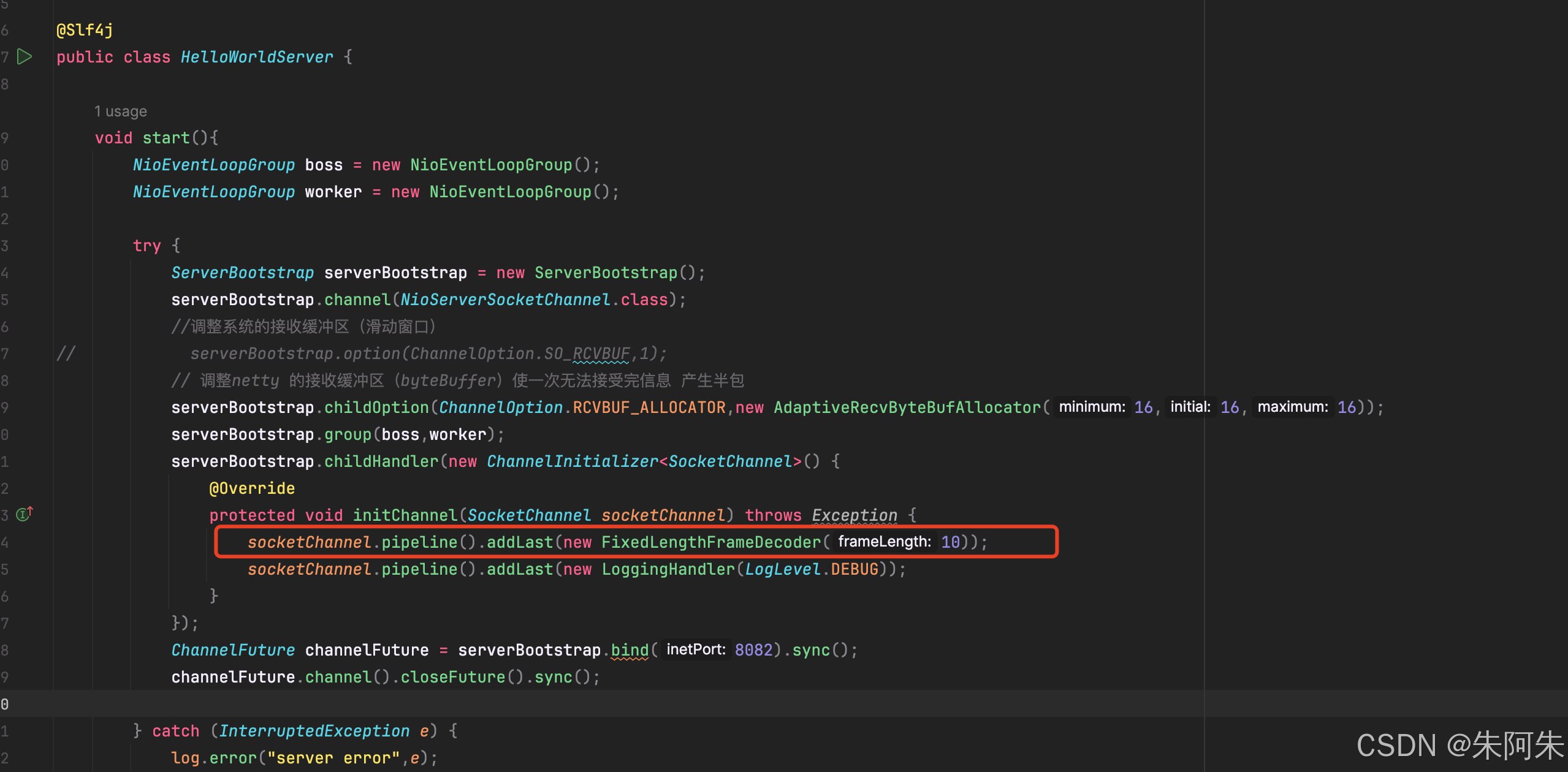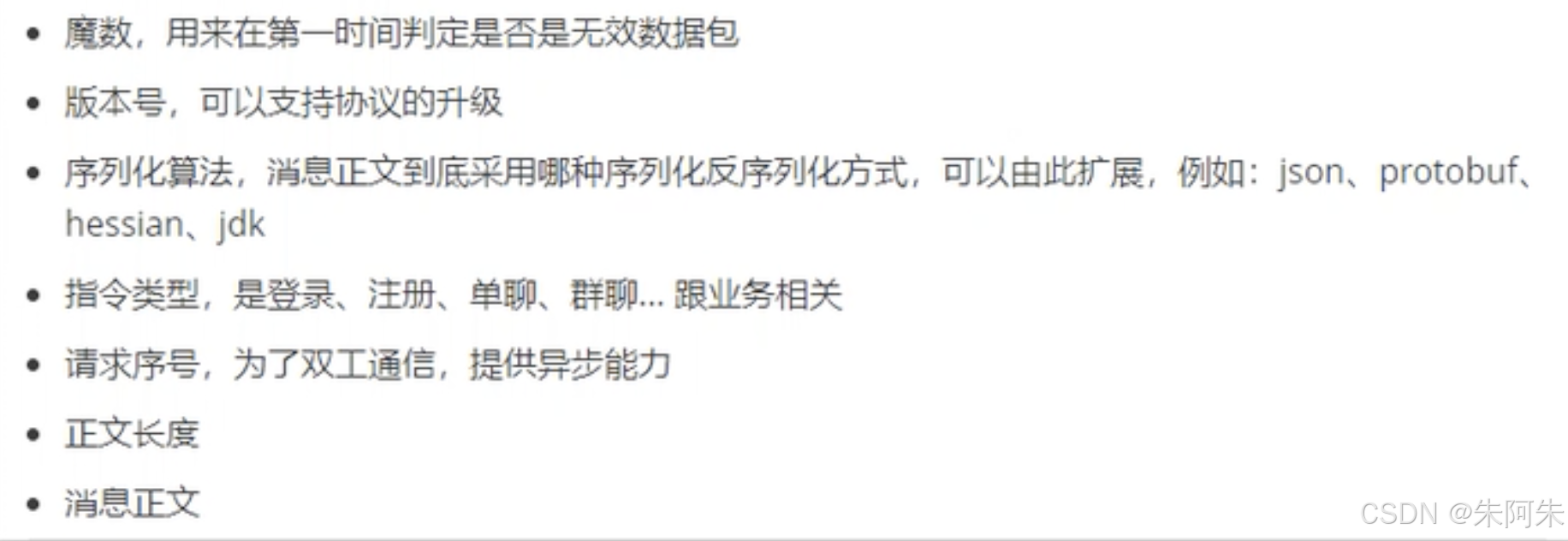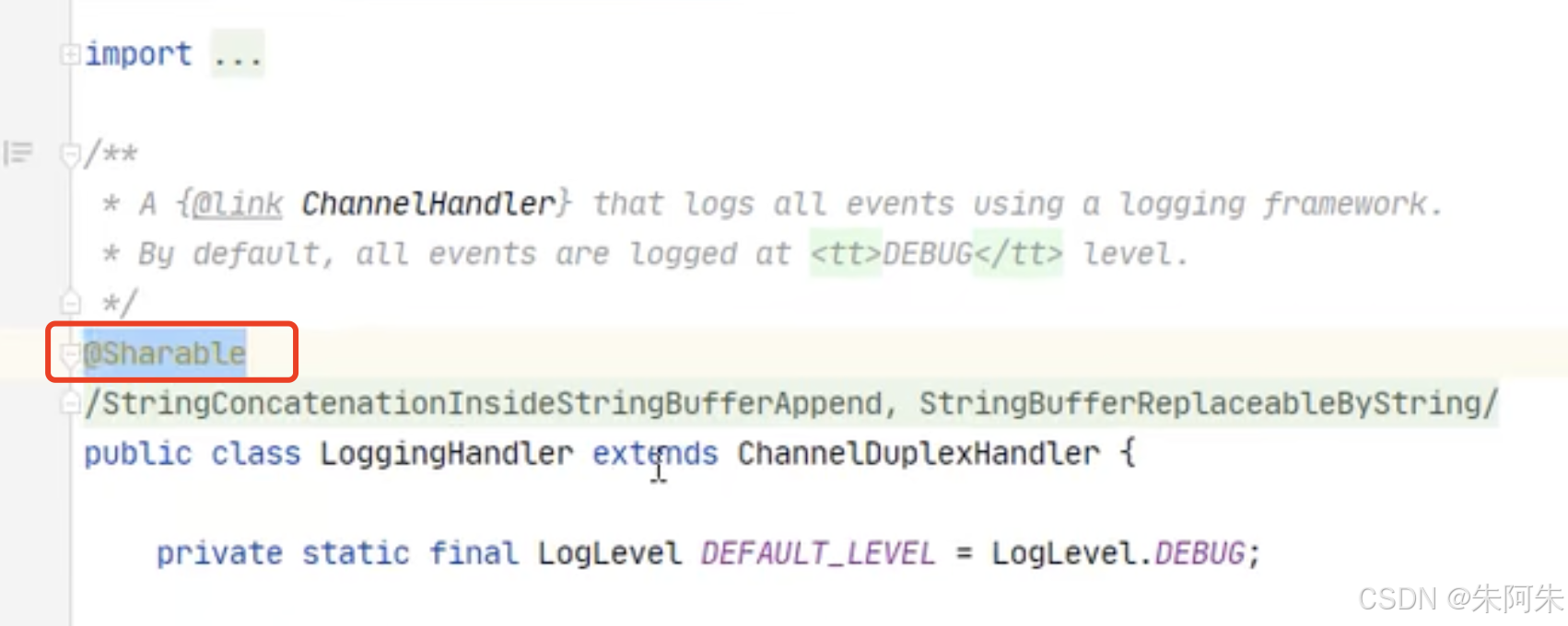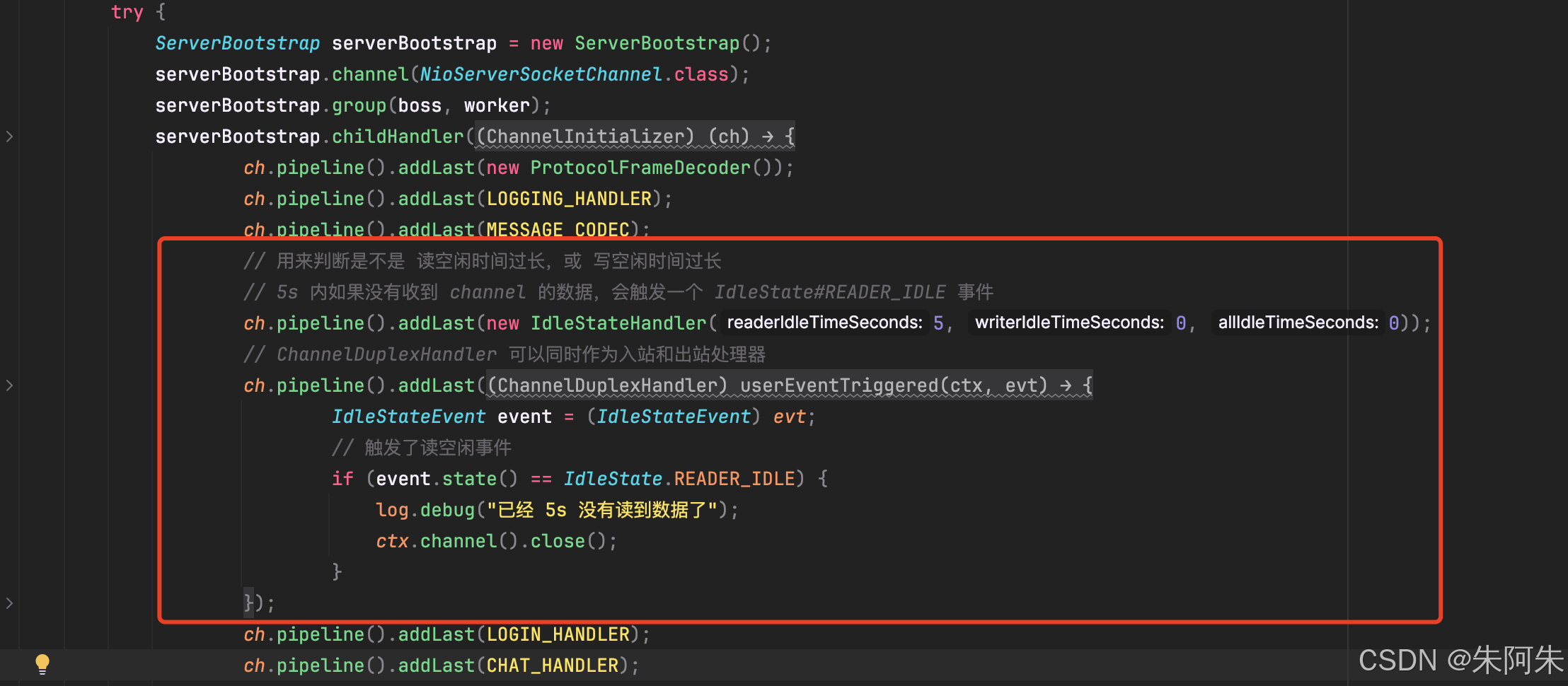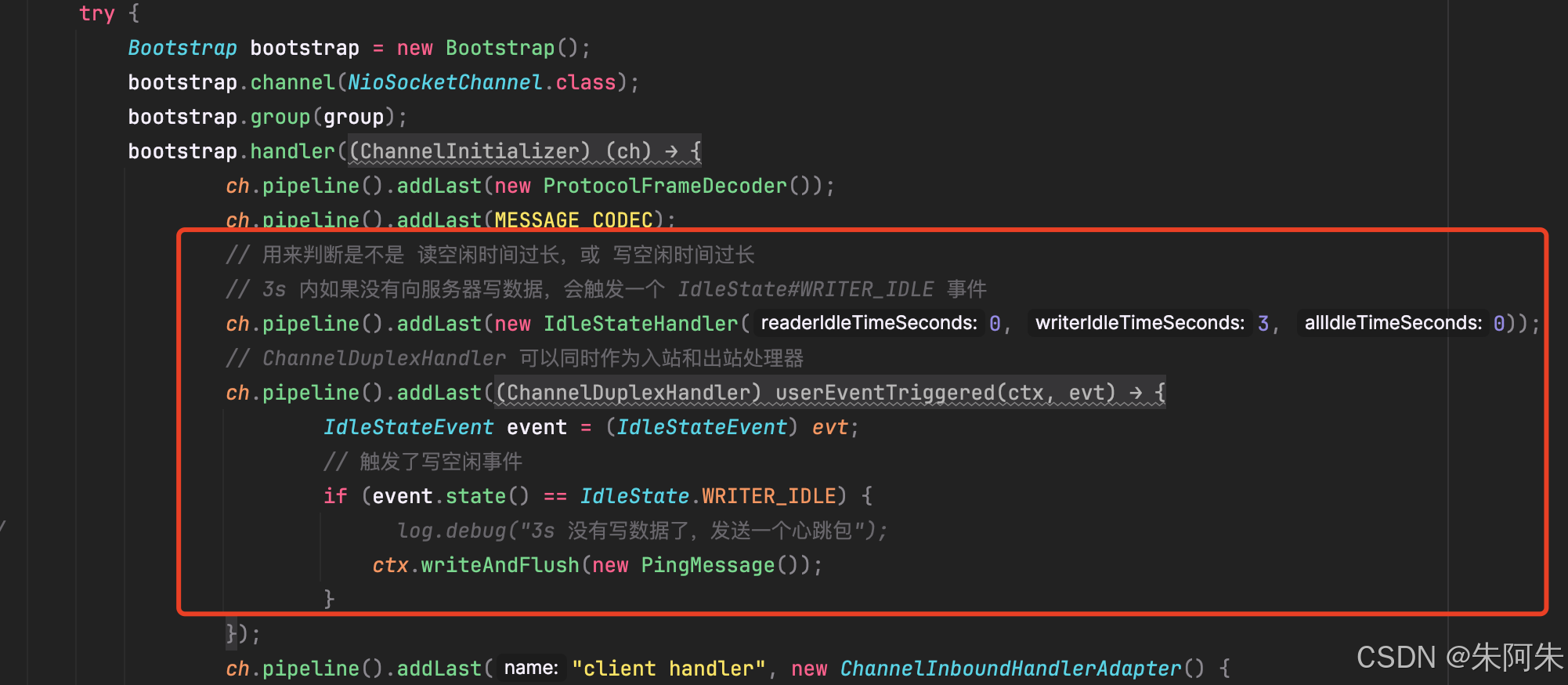黏包与半包
黏包现象
黏包指,本多次发送的数据,合并为一次发送
半包指,本应一次发生的数据,被分为一次或多次发送
滑动窗口
从 TCP 协议层分析黏包半包现象
TCP 是一个可靠的传输协议,发送一个消息需等到接收端返回一个应答,如果没有收到应答则重发消息,造成需等待应答才能发送后续消息,造成串行化,影响吞吐量
所以客户端和服务器都设计了滑动窗口概念
客户端的窗口大小即是一次能发送的多个消息决定了流量大小,服务器端的窗口大小即是一次能接收的多个消息的数量,当头部消息得到响应,即一次 TCP 应答成功,窗口向下滑动,客户端再发送一次新 TCP ,服务器接收一次新 TCP。
流量比较大时
接收端窗口比较空闲时,发送端同时发送多条数据,接收端同时接收就容易将接收的消息混合,产生黏包
若是接收到一半时,窗口用完了,那么就会发生半包
产生原因分析
Nagle 是 TCP 中的优化算法,会尽可能多的发送数据,因为在传输层和 IP 层会对数据加上报头,两层报头占用 20 字节,若是只发一个字节的数据也会占用40 字节,所以 Nagle 算法会攒够一批数据再发
解决黏包
短链接方案,每发完一段数据关闭连接
半包问题
调整 netty 缓冲区大小,小于发送消息的长度,无法一次接收完,则会产生半包现象
解决半包
定长解码器
定长解码器,服务端规定接收端一次处理消息的长度,即接收端一次处理消息的长度,无论消息有多长,超过规定长度的消息,与后续的消息一起处理。每次只处理规定长度消息
如上,规定一次 处理 长度 10 的消息
分隔符解码器
基于长度字段的帧解码器
LengthFieldBasedFrameDecoder(
int maxFrameLength,
int lengthFieldOffset,
int lengthFieldLength,
int initialBytesToStrip)
public class TestlengthFieldDecoder {
public static void main(String[] args) {
EmbeddedChannel channel = new EmbeddedChannel(
new LengthFieldBasedFrameDecoder(
1024,0,4,0,0),
// maxFrameLength 最大限制长度
// lengthFieldOffset 长度的限制偏移量,从偏移量开始才是内容
// lengthFieldLength 表示长度的字段占用多少个字节
// lengthAdjustment 从长度之后需要调整的字节数(比如在长度后面标注了版本号,版本号只是内部标识)
// initialBytesToStrip 剥离表示长度字段所占的 多少个字节
new LoggingHandler(LogLevel.DEBUG)
);
// 4个字节长度,实际内容
ByteBuf buffer = ByteBufAllocator.DEFAULT.buffer();
send(buffer, "hello, world");
send(buffer, "Hi!");
channel.writeInbound(buffer);
}
private static void send(ByteBuf buffer, String s) {
byte[] content = s.getBytes();
int length = content.length;
buffer.writeInt(length);
buffer.writeByte(1);
buffer.writeBytes(content);
}
}
协议设计与解析
redis的通讯协议
redis 的协议
等同于 set name zhangsan
@Slf4j
public class TestRedis {
/*
set name zhangsan
*3
$3
set
$4
name
$8
zhangsan
*/
public static void main(String[] args) {
final byte[] LINE = {13, 10};
NioEventLoopGroup worker = new NioEventLoopGroup();
try {
Bootstrap bootstrap = new Bootstrap();
bootstrap.channel(NioSocketChannel.class);
bootstrap.group(worker);
bootstrap.handler(new ChannelInitializer<SocketChannel>() {
@Override
protected void initChannel(SocketChannel ch) {
ch.pipeline().addLast(new LoggingHandler());
ch.pipeline().addLast(new ChannelInboundHandlerAdapter() {
@Override
public void channelActive(ChannelHandlerContext ctx) {
ByteBuf buf = ctx.alloc().buffer();
buf.writeBytes("*3".getBytes());
buf.writeBytes(LINE);
buf.writeBytes("$3".getBytes());
buf.writeBytes(LINE);
buf.writeBytes("set".getBytes());
buf.writeBytes(LINE);
buf.writeBytes("$4".getBytes());
buf.writeBytes(LINE);
buf.writeBytes("name".getBytes());
buf.writeBytes(LINE);
buf.writeBytes("$8".getBytes());
buf.writeBytes(LINE);
buf.writeBytes("zhangsan".getBytes());
buf.writeBytes(LINE);
ctx.writeAndFlush(buf);
}
@Override
public void channelRead(ChannelHandlerContext ctx, Object msg) throws Exception {
ByteBuf buf = (ByteBuf) msg;
System.out.println(buf.toString(Charset.defaultCharset()));
}
});
}
});
ChannelFuture channelFuture = bootstrap.connect("localhost", 6379).sync();
channelFuture.channel().closeFuture().sync();
} catch (InterruptedException e) {
log.error("client error", e);
} finally {
worker.shutdownGracefully();
}
}
}
http 的通讯协议
@Slf4j
public class TestHttp {
public static void main(String[] args) {
NioEventLoopGroup boss = new NioEventLoopGroup();
NioEventLoopGroup worker = new NioEventLoopGroup();
try {
ServerBootstrap serverBootstrap = new ServerBootstrap();
serverBootstrap.channel(NioServerSocketChannel.class);
serverBootstrap.group(boss, worker);
serverBootstrap.childHandler(new ChannelInitializer<SocketChannel>() {
@Override
protected void initChannel(SocketChannel ch) throws Exception {
ch.pipeline().addLast(new LoggingHandler(LogLevel.DEBUG));
ch.pipeline().addLast(new HttpServerCodec());
// 只关心泛型内的类的入栈处理器
ch.pipeline().addLast(new SimpleChannelInboundHandler<HttpRequest>() {
@Override
protected void channelRead0(ChannelHandlerContext ctx, HttpRequest msg) throws Exception {
// 获取请求
log.debug(msg.uri());
// 返回响应
DefaultFullHttpResponse response =
new DefaultFullHttpResponse(msg.protocolVersion(), HttpResponseStatus.OK);
byte[] bytes = "<h1>Hello, world!</h1>".getBytes();
// 在响应头加一个响应体长度参数 否则浏览器会一直转圈等待接收更多的响应内容,以为响应还未接收完毕
response.headers().setInt(CONTENT_LENGTH, bytes.length);
response.content().writeBytes(bytes);
// 写回响应
ctx.writeAndFlush(response);
}
});
/*ch.pipeline().addLast(new ChannelInboundHandlerAdapter() {
@Override
public void channelRead(ChannelHandlerContext ctx, Object msg) throws Exception {
log.debug("{}", msg.getClass());
if (msg instanceof HttpRequest) { // 请求行,请求头
} else if (msg instanceof HttpContent) { //请求体
}
}
});*/
}
});
ChannelFuture channelFuture = serverBootstrap.bind(8080).sync();
channelFuture.channel().closeFuture().sync();
} catch (InterruptedException e) {
log.error("server error", e);
} finally {
boss.shutdownGracefully();
worker.shutdownGracefully();
}
}
}
自定义协议
前面 redis 多个数据之间用回车换行分割,这样的消息不够紧凑,占用带宽太多,我们可以开发字节数更紧凑,效率更高的协议
要素
自定义协议的要素
protobuf 和 Hessian 都是谷歌出品 基于二进制,虽然可读性不好,但是字节数占用更少,性能更好
编码
依照自定义协议的要素编写编解码器
出栈编码,出栈前将自定义的 Message 编译成 ByteBuf
public class MessageCodec extends ByteToMessageCodec<Message> {
@Override
protected void encode(ChannelHandlerContext channelHandlerContext, Message message, ByteBuf out) throws Exception {
// 1. 4 字节的魔数
out.writeBytes(new byte[]{1, 2, 3, 4});
// 2. 1 字节的版本,
out.writeByte(1);
// 3. 1 字节的序列化方式 jdk 0 , json 1
out.writeByte(0);
// 4. 1 字节的指令类型
out.writeByte(message.getMessageType());
// 5. 4 个字节
out.writeInt(message.getSequenceId());
// 无意义字节,对齐填充 使其长度满足 2 的整数倍
out.writeByte(0xff);
// 6. 获取内容的字节数组
ByteArrayOutputStream bos = new ByteArrayOutputStream();
ObjectOutputStream oos = new ObjectOutputStream(bos);
oos.writeObject(message);
byte[] bytes = bos.toByteArray();
// 7. 四个字节的长度
out.writeInt(bytes.length);
// 8. 写入内容
out.writeBytes(bytes);
}
@Override
protected void decode(ChannelHandlerContext channelHandlerContext, ByteBuf in, List<Object> list) throws Exception {
}
}
进站就是出栈编码的逆过程,将编码内容一一解码
@Override
protected void decode(ChannelHandlerContext ctx, ByteBuf in, List<Object> out) throws Exception {
int magicNum = in.readInt();
byte version = in.readByte();
byte serializerType = in.readByte();
byte messageType = in.readByte();
int sequenceId = in.readInt();
in.readByte();
int length = in.readInt();
byte[] bytes = new byte[length];
in.readBytes(bytes, 0, length);
ObjectInputStream ois = new ObjectInputStream(new ByteArrayInputStream(bytes));
Message message = (Message) ois.readObject();
log.debug("{}, {}, {}, {}, {}, {}", magicNum, version, serializerType, messageType, sequenceId, length);
log.debug("{}", message);
out.add(message);
}
测试
public class TestMessageCodec {
public static void main(String[] args) throws Exception {
// 为避免黏包半包 加入帧解码器
EmbeddedChannel channel = new EmbeddedChannel(
// 限制最大长度 1024,
// 长度字段偏移量 头信息 - 除长度字段的长度 16 - 4 = 12,
// 长度字段的字节数 4,
// 长度不需要调整 0,是否需要去除头信息 0
new LengthFieldBasedFrameDecoder(1024,12,4,0,0),
new LoggingHandler(),
new MessageCodec()
);
// encode 编码
LoginRequestMessage loginRequestMessage = new LoginRequestMessage("zhangsan", "1234", "张三");
channel.writeOutbound(loginRequestMessage);
//decode 解码
ByteBuf buffer = ByteBufAllocator.DEFAULT.buffer();
new MessageCodec().encode(null, loginRequestMessage,buffer);
//入站
channel.writeInbound(buffer);
}
}
Shareable
能否创建一个 handler 被多个 channel 共享,能否多线程多 channel 使用,由于有些 handler 是有状态的,线程不安全的,不能在多线程下多个 channel 同时使用。
对于能在多线程下被共享使用 的 handler ,netty 做了注解标记,这样的 handler 只需要创建一个实例就 ok
分析自己的handler 是否是线程安全的设计,是否是无状态的
我们自己的编解码器不会记录未处理完的数据,没有需要记录消息的状态的问题,按理是可以被 shareable 的
但是在构建时就抛出构造函数异常 ,显然是父类的
父类源码明确表示子类不能被标注 shareable
如何绕过限制,换一个父类,没有 shareable 进行限制
聊天室案例
业务介绍
/**
* 用户管理接口
*/
public interface UserService {
/**
* 登录
* @param username 用户名
* @param password 密码
* @return 登录成功返回 true, 否则返回 false
*/
boolean login(String username, String password);
}
/**
* 会话管理接口
*/
public interface Session {
/**
* 绑定会话
* @param channel 哪个 channel 要绑定会话
* @param username 会话绑定用户
*/
void bind(Channel channel, String username);
/**
* 解绑会话
* @param channel 哪个 channel 要解绑会话
*/
void unbind(Channel channel);
/**
* 获取属性
* @param channel 哪个 channel
* @param name 属性名
* @return 属性值
*/
Object getAttribute(Channel channel, String name);
/**
* 设置属性
* @param channel 哪个 channel
* @param name 属性名
* @param value 属性值
*/
void setAttribute(Channel channel, String name, Object value);
/**
* 根据用户名获取 channel
* @param username 用户名
* @return channel
*/
Channel getChannel(String username);
}
/**
* 聊天组会话管理接口
*/
public interface GroupSession {
/**
* 创建一个聊天组, 如果不存在才能创建成功, 否则返回 null
* @param name 组名
* @param members 成员
* @return 成功时返回组对象, 失败返回 null
*/
Group createGroup(String name, Set<String> members);
/**
* 加入聊天组
* @param name 组名
* @param member 成员名
* @return 如果组不存在返回 null, 否则返回组对象
*/
Group joinMember(String name, String member);
/**
* 移除组成员
* @param name 组名
* @param member 成员名
* @return 如果组不存在返回 null, 否则返回组对象
*/
Group removeMember(String name, String member);
/**
* 移除聊天组
* @param name 组名
* @return 如果组不存在返回 null, 否则返回组对象
*/
Group removeGroup(String name);
/**
* 获取组成员
* @param name 组名
* @return 成员集合, 没有成员会返回 empty set
*/
Set<String> getMembers(String name);
/**
* 获取组成员的 channel 集合, 只有在线的 channel 才会返回
* @param name 组名
* @return 成员 channel 集合
*/
List<Channel> getMembersChannel(String name);
}
登录
@Slf4j
public class ChatServer {
public static void main(String[] args) {
NioEventLoopGroup boss = new NioEventLoopGroup();
NioEventLoopGroup worker = new NioEventLoopGroup();
LoggingHandler LOGGING_HANDLER = new LoggingHandler(LogLevel.DEBUG);
MessageCodecSharable MESSAGE_CODEC = new MessageCodecSharable();
try {
ServerBootstrap serverBootstrap = new ServerBootstrap();
serverBootstrap.channel(NioServerSocketChannel.class);
serverBootstrap.group(boss, worker);
serverBootstrap.childHandler(new ChannelInitializer<SocketChannel>() {
@Override
protected void initChannel(SocketChannel ch) throws Exception {
ch.pipeline().addLast(new ProcotolFrameDecoder());
ch.pipeline().addLast(LOGGING_HANDLER);
ch.pipeline().addLast(MESSAGE_CODEC);
ch.pipeline().addLast(new SimpleChannelInboundHandler<LoginRequestMessage>() {
@Override
protected void channelRead0(ChannelHandlerContext ctx, LoginRequestMessage msg) throws Exception {
String username = msg.getUsername();
String password = msg.getPassword();
boolean login = UserServiceFactory.getUserService().login(username, password);
LoginResponseMessage message;
if(login) {
message = new LoginResponseMessage(true, "登录成功");
} else {
message = new LoginResponseMessage(false, "用户名或密码不正确");
}
ctx.writeAndFlush(message);
}
});
}
});
Channel channel = serverBootstrap.bind(8080).sync().channel();
channel.closeFuture().sync();
} catch (InterruptedException e) {
log.error("server error", e);
} finally {
boss.shutdownGracefully();
worker.shutdownGracefully();
}
}
}
@Slf4j
public class ChatClient {
public static void main(String[] args) {
NioEventLoopGroup group = new NioEventLoopGroup();
LoggingHandler LOGGING_HANDLER = new LoggingHandler(LogLevel.DEBUG);
MessageCodecSharable MESSAGE_CODEC = new MessageCodecSharable();
CountDownLatch WAIT_FOR_LOGIN = new CountDownLatch(1);
AtomicBoolean LOGIN = new AtomicBoolean(false);
try {
Bootstrap bootstrap = new Bootstrap();
bootstrap.channel(NioSocketChannel.class);
bootstrap.group(group);
bootstrap.handler(new ChannelInitializer<SocketChannel>() {
@Override
protected void initChannel(SocketChannel ch) throws Exception {
ch.pipeline().addLast(new ProcotolFrameDecoder());
// ch.pipeline().addLast(LOGGING_HANDLER);
ch.pipeline().addLast(MESSAGE_CODEC);
ch.pipeline().addLast("client handler", new ChannelInboundHandlerAdapter() {
// 接收响应消息
@Override
public void channelRead(ChannelHandlerContext ctx, Object msg) throws Exception {
log.debug("msg: {}", msg);
if ((msg instanceof LoginResponseMessage)) {
LoginResponseMessage response = (LoginResponseMessage) msg;
if (response.isSuccess()) {
// 如果登录成功
LOGIN.set(true);
}
// 唤醒 system in 线程
WAIT_FOR_LOGIN.countDown();
}
}
// 在连接建立后触发 active 事件
@Override
public void channelActive(ChannelHandlerContext ctx) throws Exception {
// 负责接收用户在控制台的输入,负责向服务器发送各种消息
new Thread(() -> {
Scanner scanner = new Scanner(System.in);
System.out.println("请输入用户名:");
String username = scanner.nextLine();
System.out.println("请输入密码:");
String password = scanner.nextLine();
// 构造消息对象
LoginRequestMessage message = new LoginRequestMessage(username, password);
// 发送消息
ctx.writeAndFlush(message);
System.out.println("等待后续操作...");
try {
WAIT_FOR_LOGIN.await();
} catch (InterruptedException e) {
e.printStackTrace();
}
// 如果登录失败
if (!LOGIN.get()) {
ctx.channel().close();
return;
}
while (true) {
System.out.println("==================================");
System.out.println("send [username] [content]");
System.out.println("gsend [group name] [content]");
System.out.println("gcreate [group name] [m1,m2,m3...]");
System.out.println("gmembers [group name]");
System.out.println("gjoin [group name]");
System.out.println("gquit [group name]");
System.out.println("quit");
System.out.println("==================================");
String command = scanner.nextLine();
String[] s = command.split(" ");
switch (s[0]){
case "send":
ctx.writeAndFlush(new ChatRequestMessage(username, s[1], s[2]));
break;
case "gsend":
ctx.writeAndFlush(new GroupChatRequestMessage(username, s[1], s[2]));
break;
case "gcreate":
Set<String> set = new HashSet<>(Arrays.asList(s[2].split(",")));
set.add(username); // 加入自己
ctx.writeAndFlush(new GroupCreateRequestMessage(s[1], set));
break;
case "gmembers":
ctx.writeAndFlush(new GroupMembersRequestMessage(s[1]));
break;
case "gjoin":
ctx.writeAndFlush(new GroupJoinRequestMessage(username, s[1]));
break;
case "gquit":
ctx.writeAndFlush(new GroupQuitRequestMessage(username, s[1]));
break;
case "quit":
ctx.channel().close();
return;
}
}
}, "system in").start();
}
});
}
});
Channel channel = bootstrap.connect("localhost", 8080).sync().channel();
channel.closeFuture().sync();
} catch (Exception e) {
log.error("client error", e);
} finally {
group.shutdownGracefully();
}
}
}
单聊
服务器端将 handler 独立出来
登录 handler
@ChannelHandler.Sharable
public class LoginRequestMessageHandler extends SimpleChannelInboundHandler<LoginRequestMessage> {
@Override
protected void channelRead0(ChannelHandlerContext ctx, LoginRequestMessage msg) throws Exception {
String username = msg.getUsername();
String password = msg.getPassword();
boolean login = UserServiceFactory.getUserService().login(username, password);
LoginResponseMessage message;
if(login) {
SessionFactory.getSession().bind(ctx.channel(), username);
message = new LoginResponseMessage(true, "登录成功");
} else {
message = new LoginResponseMessage(false, "用户名或密码不正确");
}
ctx.writeAndFlush(message);
}
}
@ChannelHandler.Sharable
public class ChatRequestMessageHandler extends SimpleChannelInboundHandler<ChatRequestMessage> {
@Override
protected void channelRead0(ChannelHandlerContext ctx, ChatRequestMessage msg) throws Exception {
String to = msg.getTo();
Channel channel = SessionFactory.getSession().getChannel(to);
// 在线
if(channel != null) {
channel.writeAndFlush(new ChatResponseMessage(msg.getFrom(), msg.getContent()));
}
// 不在线
else {
ctx.writeAndFlush(new ChatResponseMessage(false, "对方用户不存在或者不在线"));
}
}
}
群聊
创建群聊
@ChannelHandler.Sharable
public class GroupCreateRequestMessageHandler extends SimpleChannelInboundHandler<GroupCreateRequestMessage> {
@Override
protected void channelRead0(ChannelHandlerContext ctx, GroupCreateRequestMessage msg) throws Exception {
String groupName = msg.getGroupName();
Set<String> members = msg.getMembers();
// 群管理器
GroupSession groupSession = GroupSessionFactory.getGroupSession();
Group group = groupSession.createGroup(groupName, members);
if (group == null) {
// 发生成功消息
ctx.writeAndFlush(new GroupCreateResponseMessage(true, groupName + "创建成功"));
// 发送拉群消息
List<Channel> channels = groupSession.getMembersChannel(groupName);
for (Channel channel : channels) {
channel.writeAndFlush(new GroupCreateResponseMessage(true, "您已被拉入" + groupName));
}
} else {
ctx.writeAndFlush(new GroupCreateResponseMessage(false, groupName + "已经存在"));
}
}
}
群聊信息
@ChannelHandler.Sharable
public class GroupChatRequestMessageHandler extends SimpleChannelInboundHandler<GroupChatRequestMessage> {
@Override
protected void channelRead0(ChannelHandlerContext ctx, GroupChatRequestMessage msg) throws Exception {
List<Channel> channels = GroupSessionFactory.getGroupSession()
.getMembersChannel(msg.getGroupName());
for (Channel channel : channels) {
channel.writeAndFlush(new GroupChatResponseMessage(msg.getFrom(), msg.getContent()));
}
}
}
加入群聊
@ChannelHandler.Sharable
public class GroupJoinRequestMessageHandler extends SimpleChannelInboundHandler<GroupJoinRequestMessage> {
@Override
protected void channelRead0(ChannelHandlerContext ctx, GroupJoinRequestMessage msg) throws Exception {
Group group = GroupSessionFactory.getGroupSession().joinMember(msg.getGroupName(), msg.getUsername());
if (group != null) {
ctx.writeAndFlush(new GroupJoinResponseMessage(true, msg.getGroupName() + "群加入成功"));
} else {
ctx.writeAndFlush(new GroupJoinResponseMessage(true, msg.getGroupName() + "群不存在"));
}
}
}
退出群聊
@ChannelHandler.Sharable
public class GroupQuitRequestMessageHandler extends SimpleChannelInboundHandler<GroupQuitRequestMessage> {
@Override
protected void channelRead0(ChannelHandlerContext ctx, GroupQuitRequestMessage msg) throws Exception {
Group group = GroupSessionFactory.getGroupSession().removeMember(msg.getGroupName(), msg.getUsername());
if (group != null) {
ctx.writeAndFlush(new GroupJoinResponseMessage(true, "已退出群" + msg.getGroupName()));
} else {
ctx.writeAndFlush(new GroupJoinResponseMessage(true, msg.getGroupName() + "群不存在"));
}
}
}
查看成员
@ChannelHandler.Sharable
public class GroupMembersRequestMessageHandler extends SimpleChannelInboundHandler<GroupMembersRequestMessage> {
@Override
protected void channelRead0(ChannelHandlerContext ctx, GroupMembersRequestMessage msg) throws Exception {
Set<String> members = GroupSessionFactory.getGroupSession()
.getMembers(msg.getGroupName());
ctx.writeAndFlush(new GroupMembersResponseMessage(members));
}
}
退出
@Slf4j
@ChannelHandler.Sharable
public class QuitHandler extends ChannelInboundHandlerAdapter {
// 当连接断开时触发 inactive 事件
@Override
public void channelInactive(ChannelHandlerContext ctx) throws Exception {
SessionFactory.getSession().unbind(ctx.channel());
log.debug("{} 已经断开", ctx.channel());
}
// 当出现异常时触发
@Override
public void exceptionCaught(ChannelHandlerContext ctx, Throwable cause) throws Exception {
SessionFactory.getSession().unbind(ctx.channel());
log.debug("{} 已经异常断开 异常是{}", ctx.channel(), cause.getMessage());
}
}
空闲检测
连接假死
原因
- 网络设备出现故障,例如网卡,机房等,底层的 TCP 连接已经断开了,但应用程序没有感知到,仍然占用着资源。
- 公网网络不稳定,出现丢包。如果连续出现丢包,这时现象就是客户端数据发不出去,服务端也一直收不到数据,就这么一直耗着
- 应用程序线程阻塞,无法进行数据读写
问题
- 假死的连接占用的资源不能自动释放
- 向假死的连接发送数据,得到的反馈是发送超时
服务器端解决
- 怎么判断客户端连接是否假死呢?如果能收到客户端数据,说明没有假死。因此策略就可以定为,每隔一段时间就检查这段时间内是否接收到客户端数据,没有就可以判定为连接假死
客户端定时心跳
-
客户端可以定时向服务器端发送数据,只要这个时间间隔小于服务器定义的空闲检测的时间间隔,那么就能防止前面提到的误判,客户端可以定义如下心跳处理器
-
避免客户端因暂时无数据发送,造成触发服务器读空闲事件,为了向服务器证明客户端保持存活,持续发送心跳包
